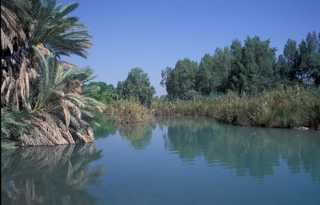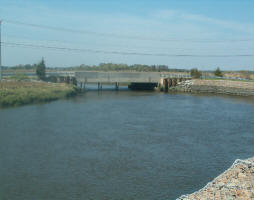 Global Climate Change, Biodiversity and Sustainability: Challenges & Opportunities - An international conference focused on the Arab MENA region and EuroMed
Global Climate Change, Biodiversity and Sustainability: Challenges & Opportunities - An international conference focused on the Arab MENA region and EuroMed
Dust storms scour Iraq. Freak floods wreak havoc in Saudi Arabia and Yemen. Rising sea levels erode Egypt’s coast. Hotter, drier weather worsens water scarcity in the Middle East, already the world’s most ‘water-short’ region. The Arab world is already suffering impacts consistent with climate change predictions. A recent United Nations’ Development Programme research paper concluded that for a region that is already vulnerable to many non-climate stresses, climate change and its potential physical and socio-economic impacts are likely to exacerbate this vulnerability, leading to large-scale instability.
This vulnerability in the Middle East makes the Arab Academy for Science, Technology, and Maritime Transport, in Abu Qir, Alexandria, Egypt, the perfect setting for GLOBAL CLIMATE CHANGE, BIODIVERSITY AND SUSTAINABILITY: CHALLENGES AND OPPORTUNITIES – an international conference focused on the Arab MENA region and EuroMed.
Groups such as the European Parliament have recently described Climate Change, Biodiversity and Sustainable Development as “the greatest challenges of our time”. Recognizing that the well-being of humankind is severely affected by climate change and biodiversity loss and that it depends on healthy and resilient ecosystems, the integration of these issues is imperative.
Presented by the Arab Academy for Science, Technology and Maritime Transport (conference host), the Smithsonian Conservation Biology Institute, and the University of Prince Edward Island, this international conference will examine the challenges and opportunities for integrating the three issues of global climate change, biodiversity and sustainability. The conference will provide a collection of keynote speakers, paper and poster sessions, training opportunities, discussion workshops, as well as study tours.
Join leading academics, Nobel laureates, and environment practitioners April 15 to 18, 2013to explore the challenges and opportunities faced by our World.
Global Climate Change – Thousands of scientists, as part of the Intergovernmental Panel on Climate Change (IPCC), have concluded that the future will be a warmer and wetter world. And as Michael Oppenheimer, a Princeton University climate scientist says, “A hotter, moister atmosphere is an atmosphere primed to trigger disasters. As the world gets hotter, the risks get higher.” The risks include more intense and longer droughts; hot days become even hotter and occur more often; heavy precipitation will occur more often; wind speed of tropical cyclones will increase; and mean sea level rise will contribute to upward trends in extreme coastal high water levels.
Biodiversity – According to the most recent Global Biodiversity Outlook, the state of biodiversity continues to decline despite an increase in conservation efforts, largely because the pressures on biodiversity continue to increase. Biodiversity underpins a wide range of services to humans that support economies, food production systems and secure living conditions. The loss of biodiversity (at the genetic, species and ecosystem levels) also affects human health in many ways. Directly, medicinal plants face a high risk of extinction in those parts of the world where people are most dependent on them for health care and income from wild collection – namely Africa, Asia, the Pacific and South America. Plant and animal species in all groups are presently threatened with extinction.
Sustainability – Coming 20 years following the seminal UN Conference on Environment and Development, the United Nations Conference on Sustainable Development concluded by stating that the World needs to move towards achieving sustainable development. This is to be accomplished by promoting sustained, inclusive and equitable economic growth; creating greater opportunities for all; reducing inequalities; raising basic standards of living; and fostering equitable social development and inclusion. Most importantly, the World needs to promote integrated and sustainable management of natural resources and ecosystems that support economic, social and human development while facilitating ecosystem conservation, regeneration and restoration and resilience in the face of new and emerging challenges.
The conference aims to establish the scientific foundation for sound decisions on infrastructure, urban development, natural resources, public health, and insurance, as well as for planning—from community organizations to international disaster risk management.
Goals:
- To review the baseline data and systematic observation networks to assess biodiversity conservation, sustainability options and policy responses to global climate change.
- To integrate our knowledge of likely future changes from a changing climate, reflecting both scientific and traditional knowledge.
- To report on predictive models and decision support tools to guide the design and selection of adaptation strategies from local to regional scales.
- To establish a framework for future collaborative research on climate change, biodiversity and sustainable development.
Accepted papers will be published by the Smithsonian Institution Scholarly Press, a peer-reviewed press dedicated to publishing Smithsonian research and scholarship.
Global Climate Change – Thousands of scientists, as part of the Intergovernmental Panel on Climate Change (IPCC), have concluded that the future will be a warmer and wetter world. And as Michael Oppenheimer, a Princeton University climate scientist says, “A hotter, moister atmosphere is an atmosphere primed to trigger disasters. As the world gets hotter, the risks get higher.” The risks include more intense and longer droughts; hot days become even hotter and occur more often; heavy precipitation will occur more often; wind speed of tropical cyclones will increase; and mean sea level rise will contribute to upward trends in extreme coastal high water levels.
Biodiversity – According to the most recent Global Biodiversity Outlook, the state of biodiversity continues to decline despite an increase in conservation efforts, largely because the pressures on biodiversity continue to increase. Biodiversity underpins a wide range of services to humans that support economies, food production systems, and secure living conditions. The loss of biodiversity (at the genetic, species, and ecosystem levels) also affects human health in many ways. Directly, medicinal plants face a high risk of extinction in those parts of the world where people are most dependent on them for health care and income from wild collection – namely Africa, Asia, the Pacific, and South America. Plant and animal species in all groups are presently threatened with extinction.
Sustainability – Coming 20 years following the seminal UN Conference on Environment and Development, the United Nations Conference on Sustainable Development concluded by stating that the World needs to move towards achieving sustainable development. This is to be accomplished by promoting sustained, inclusive, and equitable economic growth; creating greater opportunities for all; reducing inequalities; raising basic standards of living; and fostering equitable social development and inclusion. Most importantly, the World needs to promote integrated and sustainable management of natural resources and ecosystems that support economic, social and human development while facilitating ecosystem conservation, regeneration, and restoration and resilience in the face of new and emerging challenges.
Groups such as the European Parliament have recently described climate change, biodiversity and sustainable development as “the greatest challenges of our time”. Recognizing that the well-being of humankind is severely affected by climate change and biodiversity loss, and that it depends on healthy and resilient ecosystems, the integration of these issues is imperative.
This three-day conference will do just that by examining the challenges to, and opportunities for, integrating the three issues of GLOBAL CLIMATE CHANGE, BIODIVERSITY AND SUSTAINABILITY. The conference will provide a collection of keynote speakers, paper and poster sessions, training opportunities, discussion workshops as well as study tours of the host city, Alexandria, and its surroundings.
The conference aims to establish the scientific foundation for sound decisions on infrastructure, urban development, natural resources, public health, and insurance, as well as for planning – from community organizations to international disaster risk management. Papers presented will provide assessments of the baseline data and systematic observation networks to assess biodiversity conservation, sustainability options and policy responses to global climate change; integrate our knowledge of likely future global changes reflecting both scientific and traditional knowledge; report on predictive models and decision support tools to guide the design and selection of adaptation strategies from local to regional scales; and establish a framework for future collaborative research on climate change, biodiversity, and sustainable development. The focus will be on institutional capacity-building in governments, research centres and universities.
We are seeking innovative contributions to share results and information from researchers, industry representatives and managers of climate change, biodiversity, and sustainability activities under the following topics:
- Risk Management
- Water Availability
- Our Changing Climate
- Urban Planning for Resilience
- Biodiversity
- Sustainable Tourism
- Coastal Erosion
- Food Security
- Adaptation to Climate Change
- Renewable Energy (wind, solar, wave, biomass)
- Integrated Coastal Zone Management
- Eco-housing
- Human Health
- Climate Economics and Finance
- Disaster Management
- Agriculture
- Environmental Refugees
- Other
Abstracts for poster presentations, short papers (10 min.) and research papers (20 min.) on these themes will be accepted until 15 January 2013.
| Contact information |
Email: climate@upei.ca |
|---|---|
| Event type | Conference |
| File link |
http://gccbs2013.com/ |
| Source | The Arab Academy for Science, Technology, and Maritime Transport |
| Subject(s) | AGRICULTURE , DRINKING WATER , DRINKING WATER AND SANITATION : COMMON PROCESSES OF PURIFICATION AND TREATMENT , ENERGY , FINANCE-ECONOMY , HEALTH - HYGIENE - PATHOGENIC MICROORGANISM , HYDRAULICS - HYDROLOGY , INDUSTRY , INFORMATION - COMPUTER SCIENCES , METHTODOLOGY - STATISTICS - DECISION AID , NATURAL MEDIUM , POLICY-WATER POLICY AND WATER MANAGEMENT , PREVENTION AND NUISANCES POLLUTION , RIGHT , RISKS AND CLIMATOLOGY , SANITATION -STRICT PURIFICATION PROCESSES , SLUDGES , TOURISM - SPORT - HOBBIES , WATER DEMAND , WATER QUALITY |
| Geographical coverage | Egypt, |
| Address | Arab Academy for Science, Technology and Maritime Transport in Abu Qir, Alexandria |
| Organizer | The Arab Academy for Science, Technology, and Maritime Transport |
| Target audience | International |
| Period | [15/04/2013 - 18/04/2013] |
| Status | Confirmed |
| Working language(s) | ENGLISH |
 you are not logged in
you are not logged in





